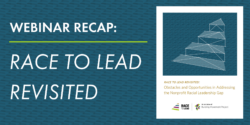Jul
2
2020
The Building Movement Project (BMP) recently hosted a webinar on the findings of the newly released report Race to Lead Revisited: Obstacles and Opportunities in Addressing the Nonprofit Racial Leadership Gap. This webinar also featured a panel discussion with Margaret Mitchell (CEO & President of YWCA Greater Cleveland), Kerrien Suarez (Executive Director of Equity in the Center), and Edgar Villanueva (Senior Vice President of the Schott Foundation and author of Decolonizing Wealth).
Quick Access: Recording, Transcript, Slides, Resources
The conversation with the three panelists was robust, rejuvenating, and affirming. A few key takeaways are outlined below.
The white advantage and white dominant culture
One of the key findings of the Race to Lead Revisited report deals with the concrete ways that structure and power in nonprofit organizations reinforce the benefits of whiteness. Kerrien Suarez said the finding on “the pervasive white advantage is deeply validating for me as a professional.” She went on to describe how many organizational practices and structures in the nonprofit sector reinforce white dominant culture and point out that leaders of color must also interrogate their own role in upholding those practices. Edgar touched on the concept of the white advantage and how it applies to how funding flows in the nonprofit sector. He noted that “we need a fundamental shift in a worldview about whose money it is … Philanthropic capital should not be treated as private wealth. Instead, this wealth inside our foundations belongs to communities and we should reallocate or redistribute that wealth in a way that reflects the diversity of communities.”
If not DEI training, then what?
The Race to Lead Revisited report found that trainings were the most commonly reported form of diversity, equity, and inclusion (DEI) initiatives. Yet many respondents expressed uncertainty about the effectiveness of trainings. Kerrien amplified this sentiment and argued that while training is important and useful, it is “transformation and the anti-racist action inside of organizations that will make progress toward equity.” Edgar added that trainings and other DEI initiatives are often seen as “add-ons,” as a way of checking a box. They should be woven into the fabric of the organization and extend beyond the 2-hour training session. He reminded us that achieving equity takes time and true commitment—”it has to be a part of what we do and who we are, every moment of our lives.” Margaret echoed these thoughts and said that racial equity needs to be recognized as a core “leadership acumen,” particularly for those who want to lead an organization in 2020 and beyond.
Leadership to meet the current moment
Kerrien confirmed that this moment in our national history is indeed changing the conversation in the nonprofit sector. Many organizational leaders, across race, are now seeing the urgency of this moment and beginning to ask questions and have conversations around race and race equity. She added that, particularly in the past month, there has been “an explicit understanding that action, not just words about diversity and inclusion, but action on anti-racism specifically needs to be taken.” Margaret agreed and added that since racism is so highly adaptive and will continue to resurface, leaders must be willing to grow and change in order to recognize and dismantle it. Edgar emphasized the need for diversity and representation, particularly with systems and supports set up for people of color entering white dominant spaces. He notes that change cannot happen in a vacuum—unless the culture changes, nothing will. He also called for grace, accountability, and continued learning and unlearning as we all strive towards achieving equity. The panel’s sentiments about what the current moment demands of leaders reflect the report’s finding that a larger share of people of color agreed that the knowledge exists for how to make nonprofits more equitable but that leaders and decision-makers lack the will to make real changes.
The panelists shared inspirational thoughts at the end of the webinar. Kerrien read a tweet by Sonja Gupta that declared: “Unlearning white supremacy isn’t Instagrammable.” Edgar described how deeply personal this work is and shared that every day he asks himself, “What can I do to make sure that everyone feels powerful?” Lastly, Margaret advised that leaders who take on issues of race equity should be prepared “for the backlash,” but implored them “Don’t turn back. Take a bold step, be courageous. It’s always the right time to do the right thing.”
To explore more of the data and analyses, you can download the full report. You can also watch the webinar recording below (or on YouTube), read the webinar transcript, download the presentation slides, and review a list of the resources mentioned during the panel.

